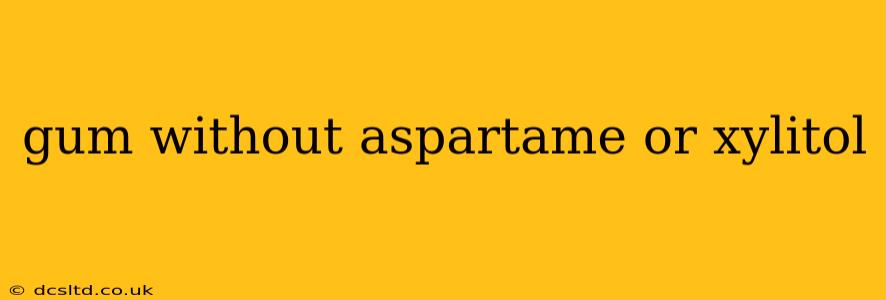Finding sugar-free gum can be tricky, especially if you're avoiding both aspartame and xylitol. These two popular artificial sweeteners are often found in commercially available sugarless gums, but many people look for alternatives due to concerns about potential side effects or dietary preferences. This guide explores the options available, helps you understand the pros and cons of different sweeteners, and provides tips for choosing the right gum for your needs.
What are the Concerns About Aspartame and Xylitol?
Many individuals avoid aspartame due to concerns about its potential link to headaches, dizziness, and other neurological symptoms. While the FDA and other regulatory bodies deem aspartame safe for consumption within acceptable daily intake levels, individual sensitivities vary.
Xylitol, while a naturally occurring sugar alcohol, poses a risk of toxicity to dogs and other pets if ingested. Even small amounts can lead to liver failure in dogs. For human consumption, while generally considered safe, excessive consumption can lead to gastrointestinal upset like bloating and diarrhea.
What Sweeteners are Used in Aspartame and Xylitol-Free Gum?
Several alternatives exist to sweeten gum without relying on aspartame or xylitol. These include:
- Sucralose: A chlorinated sucrose derivative, sucralose is a popular, calorie-free alternative often used in sugar-free products.
- Stevia: A natural, plant-based sweetener derived from the stevia plant, offering a slightly different taste profile than other artificial sweeteners. It's often described as having a slightly licorice-like aftertaste.
- Monk Fruit Extract: Another natural sweetener derived from monk fruit, offering a very sweet taste with fewer calories than sugar.
- Erythritol: A sugar alcohol found naturally in some fruits, offering a milder sweetness than xylitol and generally causing fewer digestive issues. However, like other sugar alcohols, it can still have laxative effects in large amounts.
It's important to note that even sugar alcohols like erythritol can contribute to digestive issues for some individuals. Always read the labels carefully and be mindful of your body's response.
Where Can I Find Gum Without Aspartame or Xylitol?
Finding gum that avoids both aspartame and xylitol requires careful label reading. Check the ingredient list to ensure neither sweetener is present. Many health food stores and online retailers specialize in natural and sugar-free products, offering a wider selection of options. Look for brands that explicitly state they are aspartame-free and xylitol-free on their packaging.
Are There Any Health Benefits to Chewing Sugar-Free Gum?
Some studies suggest chewing sugar-free gum can offer several potential benefits, such as:
- Increased saliva production: This can help neutralize acids in the mouth, potentially reducing the risk of cavities.
- Improved alertness: The chewing action can provide a mild stimulant effect, enhancing focus and concentration.
- Weight management: Chewing gum can help curb cravings and reduce overall calorie intake. However, this should be viewed as a supplementary aid rather than a primary method of weight loss.
What are the potential side effects of sugar alcohols in gum?
While generally considered safe, sugar alcohols like erythritol and maltitol, often used as substitutes, can cause digestive upset for some people, especially when consumed in large amounts. These side effects may include bloating, gas, and diarrhea.
Is it safe to chew sugar-free gum every day?
Moderation is key. While sugar-free gum offers several benefits, excessive consumption of any sweetener, even natural ones, isn't advisable. It's best to enjoy it in moderation as part of a balanced diet.
What are some alternatives to chewing gum for oral health?
Maintaining good oral hygiene extends beyond chewing gum. Regular brushing and flossing are crucial, as is regular dental checkups. Rinsing with mouthwash can further assist in maintaining oral health.
This guide provides a comprehensive overview of sugar-free gum options, highlighting the importance of careful label reading and understanding the different sweeteners available. Remember to consult your dentist or healthcare provider if you have concerns about any specific ingredients or potential health implications.
